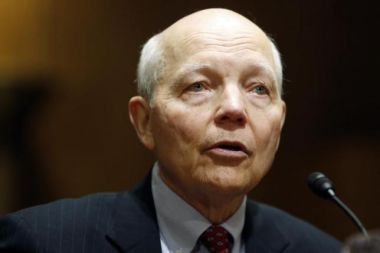IRS chief vows not to remove tax-exempt status of religious universities, colleges

The head of the Internal Revenue Service (IRS) has promised that he will not initiate any move to remove the tax-exempt status of religious universities and colleges that oppose same-sex marriage.
IRS Commissioner John Koskinen attended a Senate Judiciary Oversight Commitee hearing on July 26 where he was asked by Republican Senator Mike Lee about the tax-exempt status issue.
"Will you commit to me that as long as you remain as the commissioner of the IRS, you will not, in the absence of a directive by Congress or by the courts, a subsequent directive, one not in place right now, that you will not take any action to remove the tax exempt status from religious colleges or universities based on their belief that marriage is between a man and a woman?" Lee asked Koskinen.
"I can make that commitment," Koskinen replied.
The tax-exempt status of religious universities and colleges became an issue after the Supreme Court legalised same-sex marriage in the US last June.
The Association of American Universities (AAU) last month said majority of private and public colleges and universities are tax-exempt because of their educational purposes.
However, as tax-exempt entities, it said, "universities and colleges are regulated by both the Federal government as well as State governments."
Last month, Goshen College in Indiana and Eastern Mennonite University, members of the Council for Christian Colleges and Universities (CCCU), added sexual orientation to their non-discimination policies, opening its faculty and staff hiring to gays.
The Council said it will decide on the membership of the two institutions in the "coming weeks and months."
In the hearing, Senator Lee said, "While I greatly appreciate Commissioner Koskinen's word that he will not target religious institutions for their religious beliefs, it worries me and it should worry every American that the IRS does not absolutely disavow the power to target religious institutions based on their religious beliefs, even if the current IRS commissioner has committed not to use that power for the time being."











